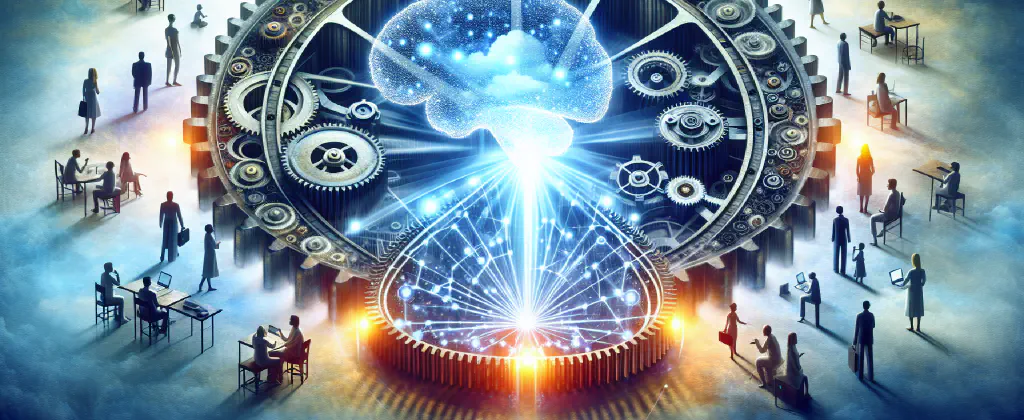12. December 2023
AI: Debunking the Singularity Myth

Artificial Intelligence (AI) has always captivated the human imagination. From science fiction novels to real-world applications, the idea of creating machines that possess human-like intelligence continues to intrigue us. One concept that has gained popularity is the concept of the Singularity. The Singularity refers to a hypothetical point in time when AI surpasses human intelligence, leading to an unprecedented era of advancement and innovation. However, a closer examination of this idea reveals that the notion of the Singularity is more like a religious schism than a scientifically substantiated hypothesis.
The Origin of the Singularity Concept
In 1993, Vernor Vinge, a renowned computer scientist and science fiction writer, introduced the concept of the Singularity. He envisioned a future where superhuman AI would accelerate technological progress exponentially, leading to a point where human comprehension of the world would be incomprehensible on the other side of the Singularity. Vinge’s depiction of the Singularity was not solely focused on AI but was a broader metaphor for the exponential growth of innovation. Unfortunately, this broader perspective seems to have been overlooked in recent discussions about the Singularity.
Marvels of Science Fiction and Detective Novels
Vinge’s ideas were brought to life in his novels, “The Peace War” and its sequel, “Marooned in Realtime.” These brilliantly crafted works combine elements of science fiction with the structure of a detective novel. Readers are taken on journeys through imaginative landscapes, exploring the implications of living in a world on the brink of the Singularity. “Marooned in Realtime” stands alone as a captivating story, while “The Peace War” provides a solid foundation for understanding the broader context of Vinge’s ideas.
Hacking Away with Python
One recurring theme in Vinge’s novels is the notion of hacking ancient code. It paints a picture of future coders unravelling and working with programs that have been written thousands of years ago. This idea is not too far-fetched when we consider that even today, we find ourselves dependent on technology we can’t fully understand or debug. As IT professionals, we often grapple with abstracted layers of complexity, and the same holds true in many other fields. So, while we may continue to hack away with Python, it is a reminder that our dependence on technology has long surpassed our full comprehension of it.
The Illusion of the Singularity
While the concept of the Singularity is enticing, we must approach it with a healthy dose of skepticism. There are those who believe that the exponential growth of innovation will inevitably lead us to a point where AI surpasses human intelligence. However, it is essential to recognize that progress is not linear, and there are physical limits to what can be achieved. The notion of infinite knowledge or infinite progress is simply unrealistic. Additionally, the hype surrounding certain technologies, such as language models, often overlooks the complexities of true human-like intelligence and agency.
Defying Boundaries and Embracing Complexity
The discussion around AI and the Singularity often sparks debates based on personal beliefs and worldviews. It is interesting to note that individuals with religious or spiritual inclinations may be more inclined to question the possibility of AI reaching a true Singularity. On the other hand, those with a more atheistic or agnostic perspective may embrace the potential of AI, believing that human consciousness is nothing more than the patterns of neurons, and AI is simply a matter of resources and time. These differing viewpoints highlight the intersection of science, philosophy, and personal beliefs in the realm of AI.
Debunking the Myth of Infinite Progress
Skepticism surrounding the Singularity is grounded in practical considerations. We still have much to understand about the complexities of human intelligence and consciousness. As we continue to unravel the mysteries of the mind, it becomes clear that true human-like intelligence cannot be achieved until we grasp fundamental concepts such as consciousness. Additionally, the notion of a singularity in innovation overlooks the reality of finite knowledge and the ever-present bottleneck of technology’s physical limitations.
While AI continues to evolve and play an increasingly significant role in our lives, we must approach the Singularity with a critical mindset. Rather than focusing solely on hypothetical leaps in progress or the quest for human-like AI, we should appreciate the incremental advancements that technology brings and embrace the complexity of the human experience. The Singularity might remain a captivating concept in science fiction, but in reality, the path to true artificial sentience is filled with twists, turns, and a deep understanding of the intricate nature of intelligence.